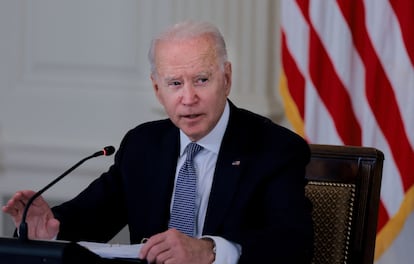US to remove Cuba from its list of state sponsors of terrorism
The measure is being adopted, among other things, to facilitate dialogue between Havana and the Catholic Church for the release of political prisoners


The United States government on Tuesday announced plans to remove Cuba from its list of state sponsors of terrorism, reversing an earlier measure by the first Trump administration. The move, according to a senior official of the Joe Biden administration who spoke on condition of anonymity, is adopted as support for the dialogue that the island’s government is developing with the Vatican for the release of political prisoners. But Trump’s return to the White House next week could cancel the step.
“It is a step taken in the national interest of the United States, but also with the understanding that it will facilitate the important dialogue that the Catholic Church is developing with respect to human rights defenders in Cuba,” the senior official said in defending the measure. Regarding the possibility that the incoming administration could decide to cancel it, he stressed that “ensuring that people in Cuba are not unjustly detained” is “a matter of great importance to the United States, which has broad support from both parties and, of course, from both Administrations.”
Washington expects that the government of Miguel Díaz-Canel will release a “large” number of prisoners after the White House has made its move, he added. Havana had pointed to the inclusion on the list as one of the major obstacles to bringing positions closer together.
In addition, Washington has suspended a clause, included in the Helms-Burton Act on the U.S. embargo on the island, that allows Cuban-Americans to claim compensation from Cuba for assets seized from them during the Castro era. That suspension, the Administration argues, is necessary for national security interests and to accelerate the transition to democracy in Cuba. The U.S. government will also eliminate a list that restricts certain Cuban entities from carrying out a series of financial transactions.
Trump’s nominee for foreign policy, Senator Marco Rubio, has always been a staunch advocate of sanctions against Cuba. The son of Cuban exiles who emigrated to the United States before Fidel Castro came to power on the island, he is scheduled to appear before the Foreign Relations Committee on Wednesday for his confirmation hearing.
“The incoming administration will certainly have the opportunity to review the position,” he admitted. But they will work with the same information that the current administration has, which shows that “there is no credible evidence at this time that Cuba is supporting international terrorism,” nor has it done so in the past six months, the requirement contemplated by national legislation to allow a country to be removed from the blacklist.
The White House again included Cuba in the list of countries sponsoring terrorism in the last days of the first Trump administration, on January 11, 2021, when it was preparing to hand over power to the Democratic administration of Joe Biden. The Republican government cited Havana’s support for the Nicolás Maduro regime in Venezuela and its refusal to extradite Colombian guerrilla leaders to Bogotá, among other arguments to justify the step. President Barack Obama had removed the island from the list during his second term, when Washington and Havana embarked on a period of diplomatic thaw.
Throughout the four years of Biden’s term in office, various human rights organizations, including the American Catholic Bishops’ Conference and foreign governments had asked Biden to remove Cuba from the list.
In October last year, the Colombian government sent a diplomatic note to Washington to request this step and to highlight how Havana had contributed to facilitating the development of peace negotiations. “Other allies, including the European Union, Spain, Canada, Colombia, Chile and many others had also requested that Cuba be removed from the designation of a country sponsoring terrorism,” the official explained.
Immediately after reports of the Biden administration’s move began to circulate, Republican Senator Ted Cruz, of the Foreign Relations Committee, lashed out at the decision, which he considered “unacceptable.” “The terrorism advanced by the Cuban regime has not ceased. I will work with President Trump and my colleagues to immediately reverse and limit the damage from the decision,” he said in a statement.
Sign up for our weekly newsletter to get more English-language news coverage from EL PAÍS USA Edition
Tu suscripción se está usando en otro dispositivo
¿Quieres añadir otro usuario a tu suscripción?
Si continúas leyendo en este dispositivo, no se podrá leer en el otro.
FlechaTu suscripción se está usando en otro dispositivo y solo puedes acceder a EL PAÍS desde un dispositivo a la vez.
Si quieres compartir tu cuenta, cambia tu suscripción a la modalidad Premium, así podrás añadir otro usuario. Cada uno accederá con su propia cuenta de email, lo que os permitirá personalizar vuestra experiencia en EL PAÍS.
¿Tienes una suscripción de empresa? Accede aquí para contratar más cuentas.
En el caso de no saber quién está usando tu cuenta, te recomendamos cambiar tu contraseña aquí.
Si decides continuar compartiendo tu cuenta, este mensaje se mostrará en tu dispositivo y en el de la otra persona que está usando tu cuenta de forma indefinida, afectando a tu experiencia de lectura. Puedes consultar aquí los términos y condiciones de la suscripción digital.








































